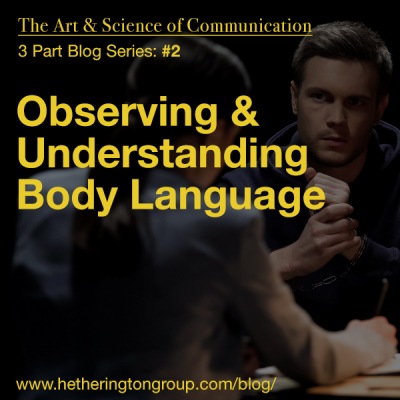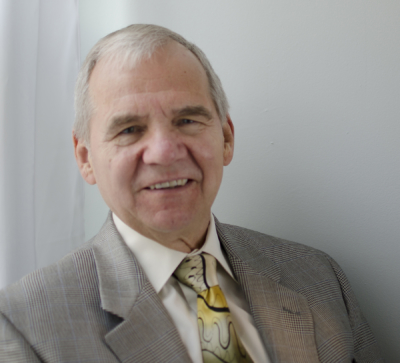Observing & Understanding Body Language
By William Majeski, LPI, Senior Advisor

Social media searches can be fruitful for the investigative researcher. Clues gained through open source techniques are often incredibly handy. An investigator can create serious leads to further an investigation and run analytical exercises to help reveal the greater or lesser results of your targeted goals. But overall, most online intelligence gathering is done in the pursuit of supporting the investigative interview. To have all the answers in-hand before you step into an interview’s conversation makes for a powerful advantage. Conversely, if you start a conversation without anticipating the answers or knowing what to expect, you can truly be taken off guard—to possibly disastrous results.
In this 3-part blog series, William Majeski, Hg’s Senior Advisor and investigator, explores the art and science of communication. As a seasoned investigator, I know when my limits are showing. It’s then that I lean on Majeski to review my findings and to start asking the hard questions. ~ Cynthia Hetherington
Throughout investigative history, one element has remained a constant: Skillful communication. The investigator’s ability to convey a message and successfully interact are fundamental to the investigative process. It will always be an essential ingredient in the formula that will achieve productive information and lead to successful outcomes. Any investigator with a solid foundation of sound investigative practices and exceptional communication skills will always find a resolution.
This week we review the five strategic ways we can enhance our interview skills and focus specifically on Observing Body Language and Understanding the Power of Body Language.
The Interview
The interview is the heart of an investigation, and skillful communication is its soul. It is a conversation with the purpose of gathering information; a process in which we deal with people, their thoughts, their actions, their reactions, and their emotions—none of which are always predictable. Ideally, we’d like our interviewing skills to be a masterful technique in which we can adjust to any interview regardless of the subject or the circumstances.
We can help achieve these goals by enhancing our performance skills in five strategic ways: Listening attentively, Playing communication chess, Observing body language, Understanding the power of body language, and Practicing pre-interview preparation.
Observing Body Language
In an interview, everyone can see the action, but few pay attention to the hidden, silent messages. The verbal component is a small part of the communication process; the majority of the process is non-verbal. If we’re not keenly observing a person’s body language, we’re missing a lot of information.
Focusing on only the spoken word makes investigators passive observers who then miss much. Make a concerted effort to become an active observer. Learn to recognize, interpret, and respond to the silent language of non-verbal behavior.
As very young, not-yet-verbal children, we learned to understand and communicate with everyone in our sphere. Without words and with only our understanding and emulation of the actions of those around us, we began to develop a skill set used to communicate. As we grew up and became educated, we gradually lost those natural skills. They can be redeveloped. We can coach ourselves to bring our observation skills to the conscious level from their native unconscious level.
Learn to classify a host of facial expressions and actions. Note hand and body movement and nervous tics. As with the unconscious sounds, these unconscious body movements represent the myriad non-verbal forms of communication that take place in everyday conversation.
How important is an investigative interview? There is good value in being able to recognize and understand the movements, the body actions, and the verbal sounds that occur in an interview. The interviewee, dealing with us on a conscious level and articulating well-thought-out verbal responses, is unaware of the continuous broadcasting of their unconscious disagreement with what they are saying and unconscious negative reaction to what we are asking.
This non-verbal process occurs simultaneously with the verbal process during the interview; mind and body working in harmony as one. Truthful messages are accompanied by smooth and comfortable deliveries. Such actions as deception, avoidance, obfuscation, and ambiguity will create disharmony between the conscious spoken word and the accompanying unconscious non-verbal reactions. A bifurcated message is truth denied.
Understanding the Power of Body Language
Consider a conversation with someone in which what they were saying just didn’t feel right—yet we did not know why it didn’t feel right. That is our unconscious mind alerting us to a delivery of non-verbal misinformation. It could’ve been a facial expression or a gesture that our unconscious identified as a negative indication.
We will be better equipped when we hone our skills and consciously recognize non-verbal behavior. When we refine that ability, then our own non-verbal behavior will be subliminally delivered on a conscious level. The interviewee is only consciously aware of his or her verbal messaging. We, however, will be consciously aware of all their verbal and non-verbal communication.
 With twenty years of global experience uncovering information on foreign business interests, small private companies, and backgrounding individuals and products, Hg’s expert advisers employ interviewing techniques that reveal far-reaching intelligence on hedge funds, private equities, and corporations; their principles, investment managers, and employees. Our interviews are conducted onsite and serially over a pre-determined period of time to probe leadership, the team, philosophical beliefs, tools, procedures, and systems. Learn how our team can help you mitigate risk at home and abroad.
With twenty years of global experience uncovering information on foreign business interests, small private companies, and backgrounding individuals and products, Hg’s expert advisers employ interviewing techniques that reveal far-reaching intelligence on hedge funds, private equities, and corporations; their principles, investment managers, and employees. Our interviews are conducted onsite and serially over a pre-determined period of time to probe leadership, the team, philosophical beliefs, tools, procedures, and systems. Learn how our team can help you mitigate risk at home and abroad.
 Mr. William Majeski has been Senior Advisor and lead investigator on complex litigation matters to the Hetherington Group since 1998. A 21-year veteran of the New York City Police Department, Mr. Majeski provides security and investigative services to corporate, business, legal, and private clients. He has conducted thousands of interviews, polygraphs, and interrogations in his career. He is considered an expert on the subjects of communication and attentive listening.
Mr. William Majeski has been Senior Advisor and lead investigator on complex litigation matters to the Hetherington Group since 1998. A 21-year veteran of the New York City Police Department, Mr. Majeski provides security and investigative services to corporate, business, legal, and private clients. He has conducted thousands of interviews, polygraphs, and interrogations in his career. He is considered an expert on the subjects of communication and attentive listening.



